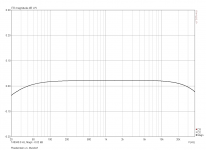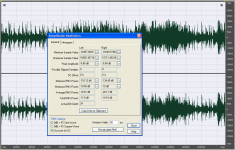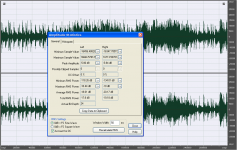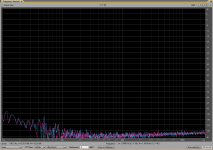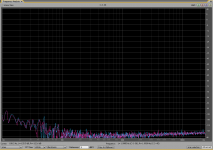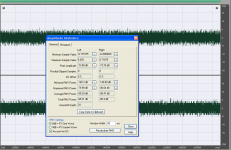Test files prepared
I have prepared 3 sound files for you, in 48kHz/24 bit. Two files are consequent take from the same capacitors, the third file is recorded through second type of capacitors. I will show you the file statistics now, for you to evaluate amplitude matching of files.
I have prepared 3 sound files for you, in 48kHz/24 bit. Two files are consequent take from the same capacitors, the third file is recorded through second type of capacitors. I will show you the file statistics now, for you to evaluate amplitude matching of files.
Attachments
Last edited:
Now I will show you FFT analysis of the difference file between two recordings from the same capacitors. This will show consistency of the replay/recording process, resulting in noise bottom only. Such test is necessary for us to know that we do not evaluate only random errors of the D/A - A/D process used. Which may happen, anyway, but the difference must not create well audible artifacts.
Attachments
Now I would like to consult the listening test method. I would like for you to post a screenshot of ABX test, foobar preferably, with minimum of 7 attempts per ABX screenshot. Do you want for me to name the files like mundorf1, roederstein2 for you to know what you hear (it would not help in ABX result at all) or shall the file names stay anonymous and you will try to tell me which is which? Once again I repeat, we have 3 files, 2 of them are through same capacitor, only different recording, third file is from second capacitor.
The difference in capacitances makes less amplitude response deviation than 0.1 dB over 20Hz - 48kHz band between the capacitor channels. Would it be OK?
It just almost passes your own requirement on level matching for ABX tests 😉
//
I think blind filenames, not due to be able to identify the actual make, but to take away chance of have being influenced ny marketing etc.
//
//
Seems quite high frequency for a coupling cap into a power amplifier.we shall have some low frequency roll off. Like -2.25dB/20Hz
What about F-3dB @ ~2Hz?
But it is matched between caps <0.1dB, and it may bring some stress to capacitors at least at very low frequencies.
Test files
OK, here are three test files. 2 of them are through same capacitor, only different recording, third file is from second capacitor.
https://www.dropbox.com/s/ce2euq2kq7v3ftz/cap1.wav
https://www.dropbox.com/s/4yjjmcef04ascag/cap2.wav
https://www.dropbox.com/s/kgeiyn17c2v4kix/cap3.wav
I would like to see:
1) an ABX result between 2 of 3 files, posted as a screenshot
2) a guess which 2 of 3 files were recorded through same capacitors (via PM, please)
3) which files are from Mundorf and which from Roederstein (via PM, please)
Anyway, if you post your ABX screenshots according to (1) only, I will appreciate it more than enough.
OK, here are three test files. 2 of them are through same capacitor, only different recording, third file is from second capacitor.
https://www.dropbox.com/s/ce2euq2kq7v3ftz/cap1.wav
https://www.dropbox.com/s/4yjjmcef04ascag/cap2.wav
https://www.dropbox.com/s/kgeiyn17c2v4kix/cap3.wav
I would like to see:
1) an ABX result between 2 of 3 files, posted as a screenshot
2) a guess which 2 of 3 files were recorded through same capacitors (via PM, please)
3) which files are from Mundorf and which from Roederstein (via PM, please)
Anyway, if you post your ABX screenshots according to (1) only, I will appreciate it more than enough.
Last edited:
Flawed setup when adding a 3rd, different file... sorry. And to call a file Cap3 when only 2 caps are tested is a bit.... odd.
//
//
Last edited:
Flawed setup when adding a 3rd
//
Would you kindly explain? I do not understand. You may ABX cap1 vs cap2 and then cap1 vs cap3 or cap3 vs cap2 to cover all possible combinations. Always only 2 files at one moment.
Names of files do not matter, right? We have agreed they would be blind, no brands defined in the file name. You are testing 2 capacitors, there are 3 files where 2 of them are recorded through same capacitors.
I understood it as;
- 2 files, same song, different caps +
- 1 file, new song, with any of the caps
A new song, with its recording aspects, induces a lot more differences than a cap - no?
//
- 2 files, same song, different caps +
- 1 file, new song, with any of the caps
A new song, with its recording aspects, induces a lot more differences than a cap - no?
//
We have only one song now.
It is recorded twice trough capacitor called for example "X"
and once through capacitor called "Y"
The task is to find if there is any detectable audible ABX difference between any two of the three files, and if yes, to say which 2 files were recorded through same capacitor.
We may add another song in next round, but now we have only one song.
It is recorded twice trough capacitor called for example "X"
and once through capacitor called "Y"
The task is to find if there is any detectable audible ABX difference between any two of the three files, and if yes, to say which 2 files were recorded through same capacitor.
We may add another song in next round, but now we have only one song.
Opps 😉 You see, PMA, it's not so easy to device a test. I'm surprised you made that simple logical error given your general confident attitude to fellow forum members 🙂
So which files should I download now? I'm confused...
//
So which files should I download now? I'm confused...
//
I have received several answers through PM and all the guys understood what they are asked to do.
1) download all files: cap1, cap2, cap3
2) make folowing ABX comparisons:
cap1 x cap2
cap2 x cap3
cap3 x cap1
That means you will make 3 independent listening comparisons.
3) post your ABX foobar results, in case you are willing to do it
4) try to answer which of the cap1, cap2 or cap3 files is a re-recorded version with the same capacitor. Possible replies are:
cap1 = cap2, newly recorded
cap2 = cap3, newly recorded
cap3 = cap1, newly recorded
5) try to assign which of the files cap1, cap2, cap3 was recorded with Mundorf and which with Roederstein.
I am sorry if my explanation is poor, but everyone else seems to understand.
1) download all files: cap1, cap2, cap3
2) make folowing ABX comparisons:
cap1 x cap2
cap2 x cap3
cap3 x cap1
That means you will make 3 independent listening comparisons.
3) post your ABX foobar results, in case you are willing to do it
4) try to answer which of the cap1, cap2 or cap3 files is a re-recorded version with the same capacitor. Possible replies are:
cap1 = cap2, newly recorded
cap2 = cap3, newly recorded
cap3 = cap1, newly recorded
5) try to assign which of the files cap1, cap2, cap3 was recorded with Mundorf and which with Roederstein.
I am sorry if my explanation is poor, but everyone else seems to understand.
Why not, but please allow me to let this test run for some time and after it is closed then we can try the straight wire version. I have a good reason for it, I do not want to influence the capacitor test even in positive or negative way, like sounds same/different.
Thanks to all who are sending their listening impressions. I would appreciate more ABX results, by now I have obtained only one set of ABX screenshots and this set verifies that to find the audible difference reliably is quite difficult in this test. By now, just one PM reply correctly states which two files were recorded with the same capacitor, but no ABX result is attached to support the opinion.
The difference between two files recorded with the same capacitor is like residual noise, you can see it in the attached FFT and in a grossly zoomed time record. On the other hand, difference file between two capacitors is quite clearly defined both in spectrum and time domain - but I do not show it yet.
The difference between two files recorded with the same capacitor is like residual noise, you can see it in the attached FFT and in a grossly zoomed time record. On the other hand, difference file between two capacitors is quite clearly defined both in spectrum and time domain - but I do not show it yet.
Attachments
- Status
- Not open for further replies.
- Home
- General Interest
- Everything Else
- Mundorf polyprop x Rodenstein MKT listening test preparation
